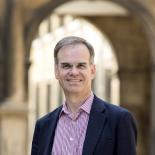Breadcrumb
Professor Andy Parker
Professor Andy Parker was born in 1956 in Bristol. He is the son of an engineer, Maurice Parker, and he spent some of his early life in Turkey, where his father worked at the Middle East Technical University in Ankara. He was educated at the French Embassy school in Ankara, and then at Queen Elizabeth’s Hospital in Bristol as a boarder. He read Physics at Pembroke College Oxford, graduating in 1978. He began his long association with the European Centre for Nuclear Research (CERN) as a summer student, before starting a PhD in Particle Physics at University College London in 1978. He was a member of the CERN staff from 1982 to 1989, with a brief period of employment as a Stagiere Étranger at the Centre d’études nucléaires at Saclay, Paris. In 1989 he was appointed as an Assistant Lecturer at the Cavendish Laboratory in Cambridge, and was elected as a Fellow of Peterhouse. Since then, he has pursued his research in particle physics, rising to Professor of High Energy Physics in 2004 and to Head of the Cavendish in 2013, a post he still holds. He is a Fellow of the Institute of Physics and an honorary Professor at the British-Kazakh University in Almaty.
He was a Tutor from 1990 to 1999, looking after Natural Science and Engineering students. He enjoys teaching and still supervises undergraduates in College. He was awarded the Pilkington Prize for teaching excellence in 1997.
Andy Parker has a worldwide reputation in the physics community. He was the project leader for one of the major detector systems used by the ATLAS Collaboration at the CERN Large Hadron Collider (LHC) for the discovery of the Higgs boson in 2012. The collaboration is one of the world’s largest scientific endeavours, with over 3000 participants, and Professor Parker has served in a number of leadership roles over the years, including six years on the Executive Board, and as the UK national Physics Coordinator. His research has focussed on seeking physics processes beyond those covered by the current “standard model” of particle physics, in particular supersymmetric particles and additional space dimensions. After a chance conversation at lunch at Peterhouse with the past Master, Professor Adrian Dixon, he began to apply software solutions from particle physics to radiotherapy, and this has led to a long collaboration with the Oncology Department at Addenbrooke's Hospital and a number of publications in that field. This work is now embedded in the national Radnet consortium. He has also led small interdisciplinary projects on artificial photosynthesis and muon tomography.
He is currently a member of the CERN Science Policy Committee and chair of the Scientific Advisory Committee for the Future Circular Collider, CERN’s planned successor to the LHC.
He has served nationally as a member of the Science Board for the Science and Technology Facilities Council, and internationally as a member of the Hong Kong Research Grants Committee, chairing their Physical Sciences funding panel. As Head of the Department for Physics, he led the project to design and build the Ray Dolby Centre, a new home for the Department, which contains state-of-the-art facilities for research and teaching. He secured a large capital grant from the Government, so that the Cavendish will operate as a National Facility for physics, supporting researchers across the country.
Andy Parker has two grown up daughters and a family home close to the College. He will resign his University roles in order to base himself in the Master’s Lodge and devote his time to College activities, while maintaining his scientific advisory work at CERN and elsewhere.

